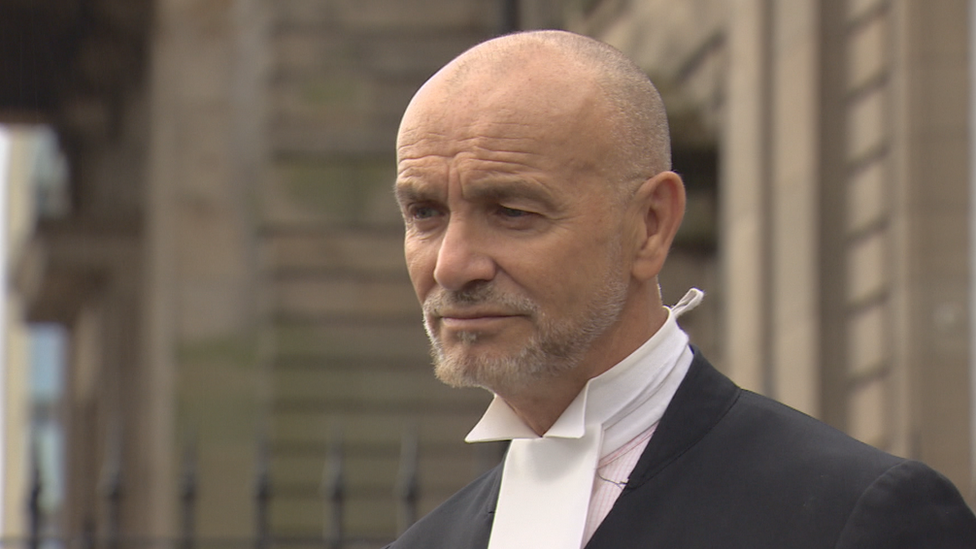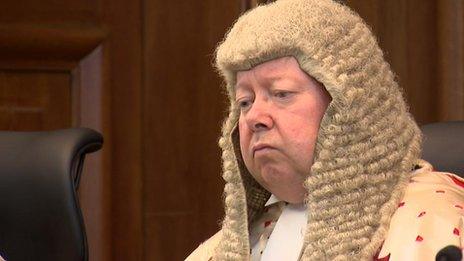Rape victims 'should not attend court' says Scotland's top judge
- Published
Lord Carloway said with the advent of modern technology there was an opportunity to improve the court system
Scotland's most senior judge has said victims of rape and sexual assault should not have to appear in court.
Lord Carloway told the BBC his "ultimate objective" was for alleged victims to be able to give filmed statements within 24 hours.
The judge also said their cross-examination should take place well before the trial and away from court.
Senior defence advocates warned that a fair trial involved being able to properly test a victim's evidence.
Leading QC Derek Ogg said he was in favour of treating witnesses and victims as humanely as possible but the defence counsel must maintain the right to test evidence by cross-examination.
'Particularly ineffective'
Three years ago, Scotland's top judge oversaw a review of how evidence was gathered and his comments to the BBC follow on from those proposals.
Lord Carloway, Lord President and Lord Justice General of Scotland, said the aim of the courts was to find the best way of getting at "the truth" and the current system was "particularly ineffective".
He said rape trials could take two to three years to come to trial and the current system was often a "memory test".
The senior judge said: "The ultimate objective is to try to get a system in which, first of all, the complainer would get their complaint down as near as possible to the event.
"That would hopefully be, in many cases, within 24 hours of the matter being reported.
"If we can get an account at that time it then becomes a question of using it within the trial process."
Lord Carloway said cross-examination could take place after an accused person had made a first appearance in court but well before the trial.
But he admitted any changes would need "to look at cross-examination and where that would fit into the system".

Rape case was like a 'memory test'
'Giving evidence at my rape trial was very intimidating'
Cathryn Coutts was raped in Edinburgh's Greyfriars kirkyard in November 2009 but it took years to get a DNA match and identify her attacker.
The case came to court last summer, almost eight years after the night of the attack.
Cathryn says that after so long it felt like a "memory test" and that waiting in court was like "hell".
"All of a sudden after all these years here it was again, back at the front of my mind," she says.
"I would try night after night to remember but nothing was coming back to me."
She says reliving the experience in court was "just an awful feeling".

The Scottish government is expected to publish draft proposals on evidence-gathering for vulnerable witnesses in June.
The primary focus will be on pre-recording evidence for child witnesses.
But ministers said they supported new ways of gathering statements at the early stages which could minimise the stress and trauma on vulnerable witnesses later on.
Filmed evidence
Lord Carloway believes specially-trained police officers should be able to film the alleged victim's original statement and that this would be what should be shown to the jury - rather than the victim having to attend court.
He said that, as early as possible in the process, the defence would be able to cross-examine the victim on camera too.
Lord Carloway, who has previously warned advocates about "protracted or vexatious questioning" of alleged victims, said the cross-examination would be under the careful direction of a judge.
He said the filmed evidence would then have to be stored in a "vault" until it could be shown to a jury in a trial.

Defence QC Derek Ogg said it was essential to cross-examine a witness
Lord Carloway said: "We have the ability to record what people do remember at or around the time of the event so it is somewhat strange that we are depending so heavily on what they're being asked in a court room months and sometimes years later.
"The review was designed to address that major problem that we have of memories fading with time."
The senior judge said studies had shown that in cases of sexual crime the traditional mode of cross- examination was "particularly ineffective at getting to the truth of the matter".
He said: "A person's memory does not improve with time or being put under stress.
"If we can attack both of these elements the time of cross-examination and resolve the issue of stress we may end up with a much better quality of evidence than what we are getting at the moment."
Lord Carloway admitted there would be resource implications.
He said: "Once you realise that the courts in Scotland are dealing with tens of thousands of cases in any given year, creating the kind of evidence vault we have in mind, and which will ultimately come to pass, is not easy and it is not something we could introduce tomorrow or even next year."
Test their story
Defence QC Derek Ogg said there were already ways of making the court environment more humane such as protective screens to separate the victim from view or using video links.
He said he supported measures to modernise the system and make it a better environment for victims but the fundamental right for a defence counsel to be able to properly cross-examine a witness must be maintained.
Mr Ogg said: "As a defence counsel it does not matter to me where the witness is. All that matters is that I give the witness a chance to tell their story and test their story.
"The hallmark of civilisation is a fair trial for the accused not a presumption that because someone makes an allegation of sexual assault or rape they are telling the truth."
Mr Ogg warned of the dangers to a fair trial of "making it as easy as possible" for allegations to be put in front of a jury without being properly tested.
He said: "The right of a defence to see their accuser and to challenge their accuser has been the way of it in all civilised societies for all time."
A Scottish government spokesman said the justice system must get better at looking after victims and witnesses and any barriers to that needed to be addressed.
He said: "Vulnerable adult witnesses deserve to know that they will receive appropriate support and assistance when they give evidence within our criminal justice system."
On Tuesday we look at the model being proposed for how to best gather evidence from children - which could mean them no longer having to attend court. To find out how it works we travel to Norway - which already uses such a system.
- Published27 February 2018

- Published7 August 2015

- Published18 December 2015
